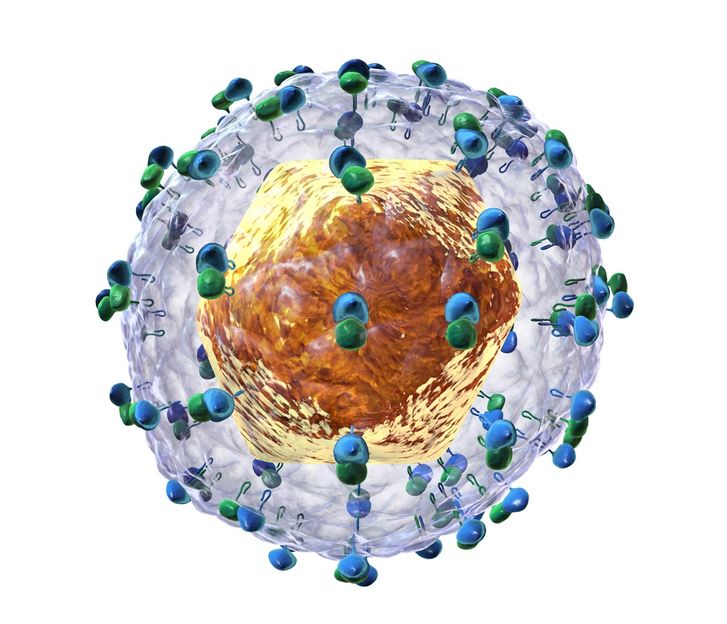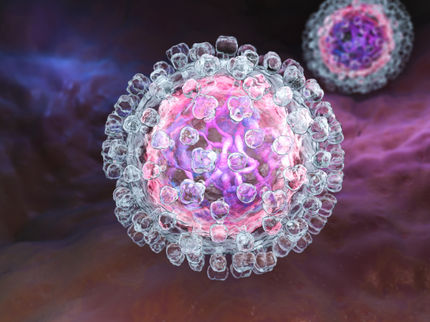Natural molecule found to inhibit hepatitis C virus replication
A team led by the CSIC shows that the nucleoside guanosine, a substance present in human cells, alters the virus machinery and prevents its propagation.
Advertisement
A team co-led by CSIC researchers has identified a natural molecule present in human cells that inhibits the replication of the hepatitis C virus, which is widespread throughout the world and is one of the main causes of liver cancer. The nucleoside guanosine, when present inside cells, causes a chain reaction that alters the replication machinery of the virus and thus prevents it from spreading. The results, published in Plos Pathogens, raise the question of whether other compounds commonly found in human metabolism might also have the potential to alter the course of viral infections.

Recreation of the hepatitis C virus.
Bruce Blaus-Wikimedia
"Guanosine is a substance that we all produce naturally and which is involved in a multitude of vital processes," says researcher Esteban Domingo, a virologist at CSIC and co-director of the study together with Dr. Antonio Mas and Dr. Celia Perales, who led a team made up of research groups from the University of Castilla La Mancha, the Fundación Jiménez Díaz and CSIC. "In this study we have shown that guanosine can drastically alter the course of a hepatitis C virus infection," adds Domingo, who together with Perales is part of the Center for Biomedical Research Network (CIBER) of Liver and Digestive Diseases.
"The molecule guanosine is a modified product of guanine, one of the four bases that in the form of derivatives called nucleotides form the links of the genetic material of all living beings, including viruses," Domingo explains. Guanine and its derivatives are extraordinarily abundant in nature and have sometimes unsuspected roles. One example is the presence of guanine in fish scales, which contributes to the ability of these aquatic vertebrates to reflect light. "Guanosine and its products modified with phosphate molecules (called nucleotides) exert multiple functions in metabolism, but an antiviral activity was difficult to suspect," says Domingo.
The three research groups have shown that the presence of guanosine alters the levels of other nucleotides inside cells, so that the hepatitis C virus multiplication machinery makes very peculiar mistakes that result in the formation of defective copies of the virus. "What the machinery does is to jump around more than it should, apparently at random, and produce genomic products of the virus that are missing pieces of the genetic material," the researcher explains.
The researchers who collaborated in this study were used to seeing how viruses make mistakes (called mutations) but what they observed with the hepatitis C virus was surprising. They uncovered this by combining analyses of virus populations that grew in the presence or absence of guanosine and by observing the behavior of the polymerase enzyme (which carries out virus replication) in the test tube.
In addition to proving that a natural metabolite can help slow down a virus, the results have uncovered a mechanism for the production of defective viruses. These forms of viruses coexist with their infectious partners and although their biological effects are beginning to be known, little is known about how they are produced. The work just published offers an interpretation of their origin and opens the way for further research.
The effect of guanosine is very clear for the hepatitis C virus but, curiously, it did not alter the multiplication of other viruses tested by these researchers, which raises the question of what the hepatitis C virus might have to produce this unusual influence. The results raise the question of whether other compounds commonly found in human metabolism could also alter the course of viral infections.
Indeed, several non-natural nucleotide derivatives are already being used as antiviral agents, including the treatment of covid-19. It is conceivable that their activity could be enhanced by the administration of natural compounds from human metabolism.
Note: This article has been translated using a computer system without human intervention. LUMITOS offers these automatic translations to present a wider range of current news. Since this article has been translated with automatic translation, it is possible that it contains errors in vocabulary, syntax or grammar. The original article in Spanish can be found here.
Original publication
R. Sabariegos, A. M. Ortega-Prieto, L. Díaz-Martínez, A. Grande-Pérez, C. G. Crespo, I. Gallego, A. I de Ávila, L. Albentosa-González, M. E. Soria, P. Gastaminza, E. Domingo, C. Perales, A. Mas; "Guanosine inhibits hepatitis C virus replication and increases indel frequencies, associated with altered intracellular nucleotide pools."; Plos Pathogens
























































